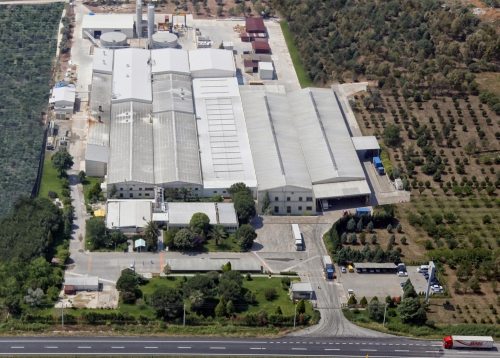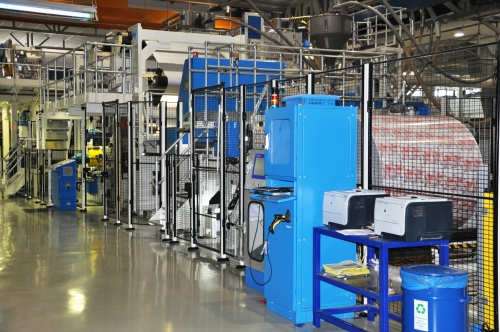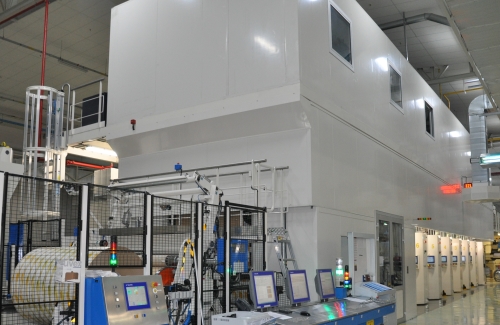Tetra Pak on June 12, 2014 announced a further investment of €36 million (US$48.69 million) in its packaging material plant in Izmir, Turkey to complete a €60 million (US$81.15 million) technology upgrade project that started in 2012.
The three-year upgrade enables the plant to more than double its capacity to 10 billion packs and broadens its capability to produce a bigger range of packages from the Tetra Pak portfolio.
The 15 sizes and forms of packages that will now be produced include Tetra Brik Aseptic 1000 Edge, Tetra Gemina Aseptic 1000 Crystal and Tetra Top 500 Midi and Tetra Top 1000 Carton Bottle.
Food News International asks Amar Zahid, cluster vice president of Tetra Pak Greater Middle East & Africa how will this investment impact Turkey, as well as his take on sustainable packaging and outreach to the community on going green.
FNI: Tetra Pak has been operating in Turkey since 1971, how have the changes in the country led to the growth of the company?
Zahid: Turkey, one of the four MINT economies, alongside Mexico, Indonesia and Nigeria, is today characterized by a fast growing economy, a large domestic consumption base and a huge, but young population with rising incomes.
At the same time, the existing market share of packaged food is relatively small.
This creates the ideal conditions for growth for our customers.
As a result, Tetra Pak is focusing on helping our customers to unlock growth through innovation in package design.
As a trend, Turkish consumers are beginning to look for highly functional and environmentally friendly packages, whilst our customers are looking for strong value in terms of costs, safety, performance and reliability.
To meet these needs, our customers have been keen to take up some of the most recent innovations within our packaging portfolio including the Tetra BrikAseptic 1000 Edge, Tetra Gemina Aseptic 1000 Crystal, Tetra Top 500 Midi and Tetra Top 1000 Carton Bottle, which have driven growth across the portfolio.
FNI: What does the investment into the Tetra Pak plant in Turkey mean to you?
Zahid: With this investment, we can now offer a much larger portfolio of 15 package designs and sizes, as well as a reduced lead time from one month to one week.
This gives our customers a greater choice in innovative package design, enables them to bring products to market faster and reduces lead time to market.
This capability, when combined with stylish design and functionality of packages such as the Tetra Gemina Aseptic 1000 Crystal, means that we are ideally placed to support the future growth of our customers.
FNI: What are the three main requirements of beverage processors of packaging in Turkey?
Zahid: While the Turkish market has unique characteristics, the main requirements for food and beverage brands are similar with the major markets around the world.
These are the ability to appeal to consumers, perform well within a retail environment and provide strong value in terms of cost and environmental performance.
With regards to consumer appeal, our research shows that a pack’s ease of use ranks within the top five criteria when it comes to a consumer’s purchase decision.
If we look at the Tetra Prisma Aseptic, one of our most popular packages in Turkey, the key to its success has been its eight-sided design.
This means that the package stands out on the shelf next to traditional rectangular packages, it is easier to grip and pour from, while pouring is easy to control without splattering or glugging.
This results in a package that looks great, and is easy to use – which in turn encourages more consumers to buy.
If we look at the retail environment, then the package’s ability to stand out on the shelf is clearly very important.
Another important consideration is the package’s impact on the wider supply chain, including logistics.
The lightweight design of our packages ensures that they are easy to transport, whilst the aseptic technology used in many of our packages means that they do not require a refrigerated cold chain, which is a major saving for any customer or retailer.
Finally, the third concern pertains to value in cost terms and environmental performance.
Our packages are predominantly constructed from a renewable resource, paperboard, and are fully recyclable, whilst our processing solutions are designed to be more effective and efficient than ever, which creates a strong value proposition for our customers, both in Turkey and worldwide.
FNI: Tetra Pak’s recycling awareness school education program has reached over a million children in Istanbul, Bursa and Izmir. Could you share more?
Zahid: As part of our global environmental strategy, Tetra Pak is committed to increasing the recycling of used beverage cartons, aiming to double the global recycling rate by 2020 to 40%.
This commitment is focused on raising consumer awareness, sharing knowledge and expertise, facilitating collection infrastructure and supporting recycling technology development.
Within Turkey, this commitment has manifested in a variety of collaborations aimed at boosting recycling rates, including projects to raise awareness of the importance of the environment and recycling.
One of these projects is run within primary schools under the banner of “Little Things Renew Nature” and has been operating since 2004 in partnership with the Turkish Ministry of National Education and Boğaziçi University.
The project aims to educate primary school students in the importance of well managed natural resources and recycling.
This is designed to help children to understand the importance of recycling from an early age and how little changes in behavior can help to conserve natural resources.
The project recognizes that children today are tomorrow’s adults and that education is one of the best ways to promote change.
More than one million children have benefited from the project over the past decade.
FNI: How have similar Tetra Pak-led carton recycling programs in other countries impact your business?
Zahid: Recycling is not our business but it is our business to make it work.
We are expected by our stakeholders to ensure the packages we produce can be and are recycled.
To make it happen, we must have active engagement from everyone in the recycling value chain.
In 2010, we set an ambition of doubling the recycling rate until 2020, which means going from 20% to 40% global recycling in 10 years.
Increasing recycling requires active engagement of the entire recycling value chain; from consumer to new products made of recycled materials.
Tetra Pak does not own or operate recycling plants or collection infrastructure but acts as a facilitator or consultant with key stakeholders in the value chain.
Increasing awareness is one of the key success factors to reach our ambition.
We do this through school programs, consumer campaigns and partnering with local organizations.
This is important as it helps to increase the number of cartons that reach recyclers and to supply recyclers with the used cartons as material.
This helps to secure a continuous collection, minimize the amount of contaminants and achieve return on investment.
In addition to helping reach our recycling target, we know consumers see recyclability as one of the most important environmental characteristics of a package.
These programs ensure the consumer is aware of the recyclability of Tetra Pak packages and drives buying choice.
FNIL: What are your views concerning the future of cartons in a growing population that is more environmentally conscious?
Zahid: Our consumer research, with the latest edition conducted in 2013, tells us that consumers associate the carton package with being the best packaging option from an environmental standpoint.
More than 70% of a Tetra Pak package is paperboard, made from wood, a renewable resource.
We believe using renewable resources, when managed responsibly, creates market differentiation.
From a cost perspective, increasing the use of renewable materials is also a prerequisite to position a business to perform well in a scenario of future raw material scarcity and to mitigate the likely cost increases that will result in this scenario.













